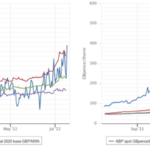
UK Energy Market Summary to Friday 15th July 2022
July 18, 2022
UK Energy Market Summary to Friday 22nd July 2022
July 25, 2022The UK government on Monday launched a review into Britain’s electricity market, seeking ways to lower costs for consumers contending with soaring energy prices.
Proposals out for initial consultation include potential changes to the wholesale electricity market in an effort to stop volatile gas prices from setting the price of electricity when renewable power is much cheaper.
Offshore wind power at an all-time low
“We’ve just seen the price of offshore UK wind power fall to an all-time low and gas is a shrinking portion of our electricity generating mix, so we need to explore ways of ensuring the electricity market is adapting,” Business and Energy Secretary Kwasi Kwarteng said in a statement.
Under the current system the cost of producing electricity from gas-fired power stations is usually the benchmark for setting the wholesale electricity price that helps to determine how much people pay for their energy.
Record UK and European energy prices
British and European gas prices have soared over the past year, peaking at record levels after Russia’s invasion of Ukraine and concerns that Russian gas supply to Europe could be severely constrained.
Benchmark wholesale British gas prices are trading about three times higher than a year ago, pushing up wholesale electricity prices by similar levels.
Domestic Price Cap
A cap on the most widely used household energy contracts increased by 54% in April, primarily because of high gas prices. That is expected to rise by 60% when the next cap level comes into effect in October, taking average household yearly dual fuel bills to more than £3,200 pounds ($3,829).
Potential Changes
The government’s suggestions include changes to the wholesale electricity market to ensure that the increasing share of cheaper electricity from renewable energy will determine the price more often instead of volatile gas prices; incentives for consumers to use grid power when demand is low or it is very sunny and windy; and reforming the capacity market to increase the participation of low-carbon flexibility technologies such as electricity storage.
The consultation will include the evolution and expansion of existing schemes such as the Capacity Market and Contracts for Difference.
The Department for Business, Energy & Industrial Strategy (BEIS) will use the consultation to further develop options during 2022-2023 before coming up with proposed reforms.
For a more detailed market analysis and advice on how to navigate your energy purchasing in the current climate please feel free to e-mail hello@gleg.co.uk.
